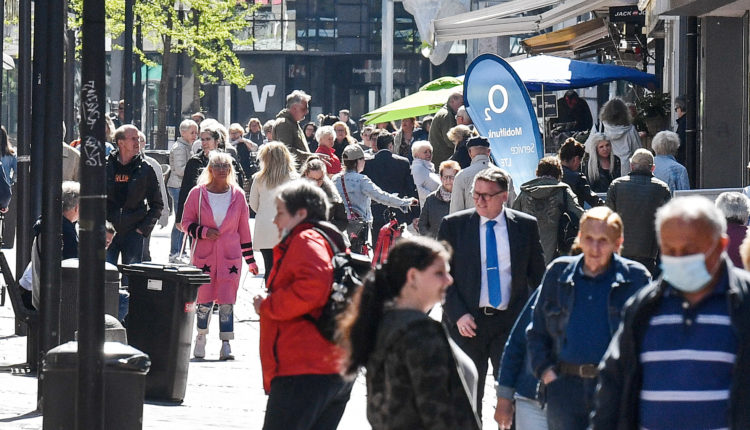Germany opens some shops as Merkel warns of second wave of coronavirus
Germany has reopened some shops and small businesses as Angela Merkel warned of the possibility of a second wave of coronavirus infection if lockdown measures were eased too swiftly.
In a video call with party colleagues the chancellor said the “discussion orgies” taking place in some German federal states on relaxing curbs on public life were unhelpful and could lead to a rise in the country’s infection rate. She said she was “greatly concerned” the public might let its guard down.
Bookshops, florists, fashion stores, bike and car outlets and other shops were all permitted to reopen on Monday morning in the first wave of easing the lockdown introduced last month.
A tentative removal of some restrictions has begun in many but not all European countries. Norway’s government reopened nurseries on Monday after a month-long closure.
It said this was possible because children were less affected by COVID-19, adding that the virus was under control. “Going to pre-school is safe,” Norway’s education minister, Guri Melby, declared.
Some parents, however, have criticised the move – a sentiment also seen in Denmark, where primary schools reopened last week. A Norwegian Facebook group called “My child should not be a guinea pig for COVID-19” has gathered nearly 30,000 signatures.
Polls suggest around a quarter of Norwegian parents do not want to send their children back to pre-school.
In Poland parks and forests were due to reopen on Monday, while in the Czech Republic open-air markets were allowed to resume as part of a six-week strategy to gradually lift restrictions. Austria has already reopened some shops. All three countries have seen significantly fewer coronavirus deaths than the worst affected countries in Europe: Italy, Spain, France and the UK.
France signalled that nurseries, primary and secondary schools would reopen on 11 May, at the end of a strict lockdown period. The prime minister, Édouard Philippe, said the return would be gradual. Merkel indicated on Monday that Germany would consider reopening schools next month.
Philippe said the French government was considering options to implement the policy, including having half a class in rotation, or first opening schools in areas where there had been few or no COVID-19 cases. However, he warned the French not to plan too far ahead, saying weddings, parties, and travel outside of France were not immediately on the cards.
“I don’t have answers today … given the barrier rules, it doesn’t seem reasonable that a marriage of say 200 people gathered in a confined place is to be envisaged. For how long I don’t know,” Philippe admitted.
In Spain, with nearly 200,000 confirmed cases and more than 20,000 deaths, the authorities have said they will hold off lifting restrictions on what is one of Europe’s toughest lockdowns. The rate of infection appears to be going down. The country reported 399 coronavirus deaths over the past 48 hours, lower than Sunday’s figure of 410.
Spain’s prime minister, Pedro Sánchez, is expected to ask parliament on Tuesday to extend a national lockdown until 11 May. He has proposed that from April 27 children under the age of 12 should be allowed out for exercise – but not teenagers. Citizens are only permitted to exit their homes to go to work, buy food or for medical reasons.



